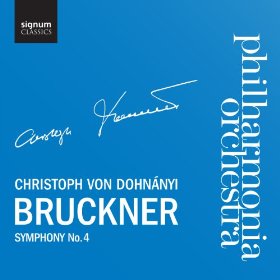BRUCKNER Symphony No 4, 'Romantic'
Dohnányi live at the RFH just as he ended Philharmonia role
View record and artist detailsRecord and Artist Details
Composer or Director: Anton Bruckner
Genre:
Orchestral
Label: Signum
Magazine Review Date: 10/2012
Media Format: CD or Download
Media Runtime: 64
Mastering:
Stereo
DDD
Catalogue Number: SIGCD256

Tracks:
| Composition | Artist Credit |
|---|---|
| Symphony No. 4, 'Romantic' |
Anton Bruckner, Composer
Anton Bruckner, Composer Christoph von Dohnányi, Conductor Philharmonia Orchestra |
Author: Rob Cowan
The Andante quasi allegretto second movement is expressive and sensibly paced, the Scherzo bracing and very well played, while the sizeable but ever-changing finale benefits from cannily judged transitions. In a word, this is intelligent, a performance that eschews the kind of inflated gestures that so often hinder Bruckner. Though, having said that, I must immediately contradict myself and quote the epic coda of Celibidache’s Munich Fourth (the one released by EMI – 11/99) as being an exception – and boy, that is very broad! But Dohnányi’s vividly (if rather closely) recorded Romantic is a genuine contender.
Discover the world's largest classical music catalogue with Presto Music.

Gramophone Digital Club
- Digital Edition
- Digital Archive
- Reviews Database
- Full website access
From £8.75 / month
Subscribe
Gramophone Full Club
- Print Edition
- Digital Edition
- Digital Archive
- Reviews Database
- Full website access
From £11.00 / month
Subscribe
If you are a library, university or other organisation that would be interested in an institutional subscription to Gramophone please click here for further information.




